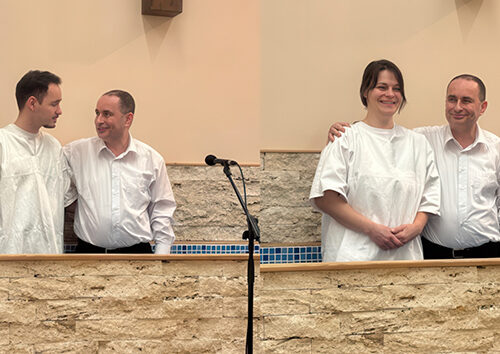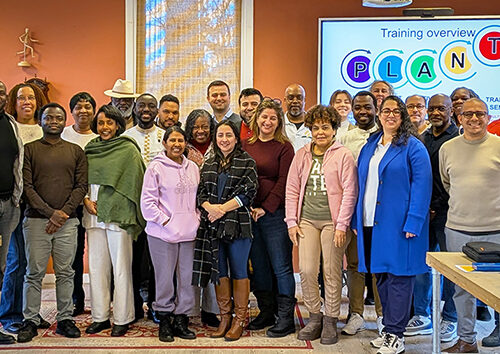06 May 2025|Sagunto, Spain [Barna Magyarosi with tedNEWS]
At the European Theological Teachers Convention (18–22 March) at Sagunto Adventist College, Spain, the theme was “Rethinking the Church in the Digital Age” Barna Magyarosi, Executive Secretary of the Inter-European Division (EUD), delivered a sermon on 2 Kings 4:18–37. His message, “Beyond the Staff: Presence in a Digital Age,” powerfully addressed the challenge of rethinking church today. A summary of his presentation follows.
In an age of livestreams, podcasts, and virtual church communities, the reach of digital ministry is broader than ever. The Word of God can now be shared instantly, globally, and creatively. We can attend Bible studies from our living rooms, pray together online, and watch sermons from our phones while waiting for a train. There is beauty and potential in this. Digital ministry is not a lesser form of ministry — it is real, impactful, and often necessary.
And yet, something crucial is at risk of being lost. In our eagerness to extend our reach, have we underestimated the irreplaceable power of simply being present?
Scripture offers a striking illustration in the story of Elisha and the Shunammite woman, found in 2 Kings 4. When her son suddenly dies, she travels urgently to find the prophet. In response, Elisha sends his servant Gehazi ahead with his staff — a tool that had been used by great leaders of Israel in miraculous acts. Gehazi obediently lays the staff on the boy, but nothing happens. No life, no breath, no change.
It’s only when Elisha himself arrives — entering the room, closing the door, and laying his body over the child — that the miracle occurs. The boy comes back to life. The staff was not enough. Presence made the difference. This story reminds us that while tools and technology have their place, there are moments when presence is the only thing that will do.

The Limits of Substitutes – When the Staff Isn’t Enough
Elisha’s staff wasn’t just a stick—it was a symbol of his prophetic authority. It had been part of his ministry, a visible sign of spiritual power. In many ways, it represented the kind of tool we might associate with modern digital ministry: a proxy, an extension, a means to convey something holy. Yet in this case, it wasn’t enough.
Gehazi did everything right. He followed the instructions. He placed the staff just as he was told. But the boy didn’t stir. There was no shortcut, no transmission of power at a distance.
How often do we, like Elisha, want to delegate our presence? We send messages, resources, and links. We create polished content and post it online, hoping it will bring life into homes and hearts. Sometimes it does. But there are situations where only presence carries the weight needed for resurrection. We can’t send our sermons to sit with the grieving, and we can’t livestream our empathy. Some moments demand more than words—they demand us.
Presence as Participation – The Power of Being Fully There
When Elisha finally arrives, he doesn’t wave a hand or speak a distant word. He climbs the stairs to the upper room, enters the space of death, and closes the door behind him. Then he does something we would think of as quite shocking: he lays himself down on the boy’s mouth-to-mouth, eyes-to-eyes, hands-to-hands. It’s intimate, intense, and deeply physical.
Elisha’s response is a picture of embodied ministry. He doesn’t just show up — he fully enters the boy’s situation. He shares breath and warmth, symbolically offering his own life in an act of radical presence. And it’s in this uncomfortable, inconvenient moment that the miracle takes place.
There’s something in this image for us. True ministry is rarely tidy. It often involves entering spaces of pain, confusion, or sorrow, not from a distance. It calls us to listen with more than our ears, to pray with more than our words, and to be with people so that they know they are not alone.
Presence is powerful because it communicates love, care, and solidarity in a way that nothing else can.

Digital Has Its Place – But Presence is Where Resurrection Happens
None of this means we throw out digital tools. Elisha’s staff wasn’t wrong — it just wasn’t enough on its own. Digital ministry can extend our reach and open doors. It can be a lifeline for those who are housebound, isolated, or exploring faith quietly from the edges.
We should continue to invest in online spaces, find creative ways to share the gospel, and steward technology wisely. But we must do so without falling into the trap of thinking it replaces presence.
Ours is an incarnational faith. We believe in a God who didn’t send a message from heaven but came in flesh and blood. Jesus didn’t send angels or scrolls — he came himself. He touched lepers, ate with sinners, wept at tombs, and called people by name.
The body of Christ is not meant to be virtual only. There is something sacred in gathering, in touch, in shared space. Resurrection moments — those times when people feel seen, known, and truly alive — most often happen not through screens, but through proximity.
Conclusion: We Go Because He Came
The Church is in a pivotal moment. The digital revolution has opened new doors, but it has also tempted us to retreat from the harder, messier, more sacrificial parts of ministry. We must not forget that there are situations where no live stream will suffice, no digital sermon will restore breath, and no email can raise the dead things in someone’s life.
Sometimes, we have to go
Sometimes, we have to be the ones who enter the room, close the door, and lay ourselves down in prayer, love, and compassion. Elisha’s story is a call back to the heart of ministry: to be present, available, and willing—not just to send something but to be someone.
Because in the end, in ministering for Christ, presence is everything.
Featured Image: David Neal [Photos: iStock and Shutterstock].



